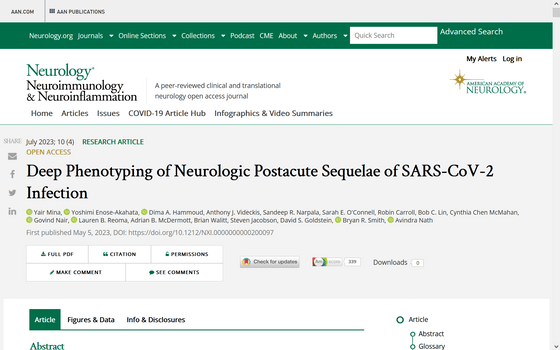The possibility that the immune system will change due to the sequelae ``Long COVID'' after infection with the new coronavirus

From the results of a survey of 12 patients suffering from the sequelae of the new coronavirus infection (COVID-19), the so-called long COVID, those who suffer from long-term symptoms have decreased immune cells called memory T cells . It was found that there was a difference in the number of immune cells compared to healthy people.
Deep Phenotyping of Neurologic Postacute Sequelae of SARS-CoV-2 Infection | Neurology Neuroimmunology & Neuroinflammation
https://doi.org/10.1212/NXI.0000000000200097

Long COVID Seems to Make Distinct Changes to The Immune System : ScienceAlert
Countries around the world have reported cases of ``long COVID'', in which symptoms similar to those of infection remain even after recovery from COVID-19, such as fatigue and poor concentration. According to researchers at the University of Groningen, at least 65 million people could be suffering from long COVID as of 2021, and the Patient-Led Research Collaborative, a long COVID research group, said, 'There are many more. It is estimated that
To find out more about the symptoms of long COVID, Yair Mina of the National Institutes of Health and colleagues tested 12 long COVID patients and compared the results to a group of healthy people who were not infected with the new coronavirus. compared to The long-COVID patient group included people 9 months (median) after onset of COVID-19, and patients had fatigue and cognitive impairment as common symptoms.

After Mina and colleagues examined patients' blood samples, cerebrospinal fluid, and MRI scans for abnormalities, and performed a battery of tests to detect autonomic nervous system dysfunction, they found that there was a difference between long-COVID patients and healthy people. It turned out that the most clearly seen difference between them was the 'immune cell count'.
Compared to controls, Long COVID patients had reduced numbers of immune cells called memory T cells. These cells usually remain in the body for a long time after infection in case reinfection occurs. In addition, long-COVID patients had increased numbers of antibody-producing B cells and natural killer cells that sense and destroy cells.
From this state, Mina et al. It is possible that it is either showing an immune reaction.'

Patients who were collected as the long COVID group this time reported that their hearts were pounding, dizzy, or faint when they stood up, or that their skin temperature was low and their blood vessels constricted, reducing blood flow to the skin. Decreased symptoms have been confirmed.
The results of this study may be useful as a material for examining the efficacy of immunotherapy against long-term COVID, and Mina et al. increase.
Related Posts:
in Science, Posted by log1p_kr







